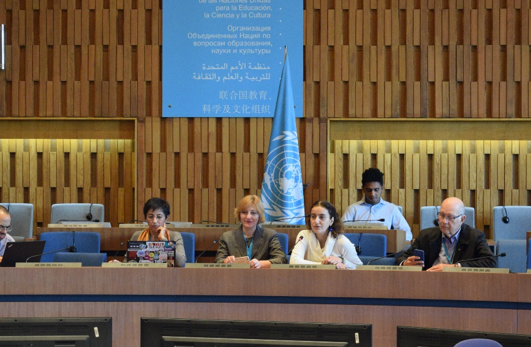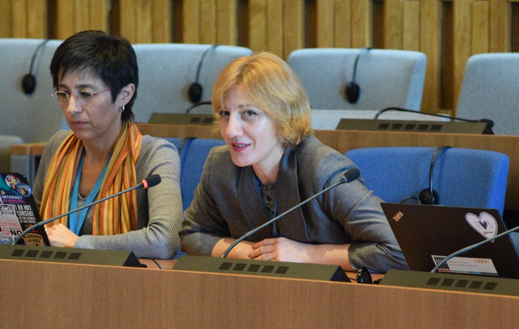IFLA at the Internet Governance Forum 2018: Libraries Central to Building a Trusted Internet
15 November 2018
The need to preserve the benefits of an open internet while finding means to address concerns about the way it works was high on the agenda at the 13th Internet Governance Forum, held in Paris from 12-14 November. IFLA was active, underlining how libraries do not only bring connectivity and training, but also essential values and skills to the discussion.
 The Internet Governance Forum offers an opportunity for all stakeholders involved in the way the internet works – governments, business, civil society – to identify opportunities and challenges, and how these can be tackled. Libraries have a major interest in an open and affordable internet, to which everyone has access. Esmeralda Moscatelli and Stephen Wyber from IFLA Headquarters attended, alongside Maia Simonishvili from the National Parliamentary Library of Georgia.
The Internet Governance Forum offers an opportunity for all stakeholders involved in the way the internet works – governments, business, civil society – to identify opportunities and challenges, and how these can be tackled. Libraries have a major interest in an open and affordable internet, to which everyone has access. Esmeralda Moscatelli and Stephen Wyber from IFLA Headquarters attended, alongside Maia Simonishvili from the National Parliamentary Library of Georgia.
An Internet for People
French President Emmanuel Macron set the tone on the first day, underlining the sense of concern that just as a state-controlled internet was not desirable, neither too was one purely controlled by the private sector.
At a side event organised by IFLA, alongside the Internet Society, Facebook, and Libraries without Borders, the President of the National Library of France, Laurence Engel, underlined this point. Public institutions needed to do online what they do offline – act where necessary to promote the public good – while promoting liberty online.
The need for a third way between state control and the dominance of big companies was clear in the meeting of the Dynamic Coalition on Public Access in Libraries. Indeed, this approach needed to focus on the bottom-up, reflecting the needs and preferences of local communities as to whether, and how, to connect.
The Role of Libraries
Libraries, as accessible, community-based institutions with an experience of information management and a public service mission, were a logical partner. Speakers from other NGOs, as well as technical experts, underlined the power of this combination of factors.
Libraries were well placed to help communities to get into action. They could offer solutions to practical problems, a space for coordination between community members, leadership in new initiatives, and training in how to take advantage of new possibilities.
As Maia Simonishvili underlined, drawing on her own experience from Georgia, by becoming hubs for internet engagement, libraries had gone from being seen as out of date to taking on a more important role than ever in their communities.

Policies for Public Access
The open session of the Dynamic Coalition on Public Access in Libraries (DC-PAL) – a group of NGOs and experts interested in delivering the potential of libraries as internet access points – focused on the policies necessary to make public access work.
Interventions focused on questions around finance, connectivity, law, regulation and education, and will feed in to the Toolkit on Public Access which IFLA has led on behalf of DC-PAL. This is currently out for consultation until mid-December.
Early next year, this toolkit will be published as a support to library associations worldwide in their advocacy around public access.
Find out more about how to get involved in the IGF, and comment on the draft toolkit.